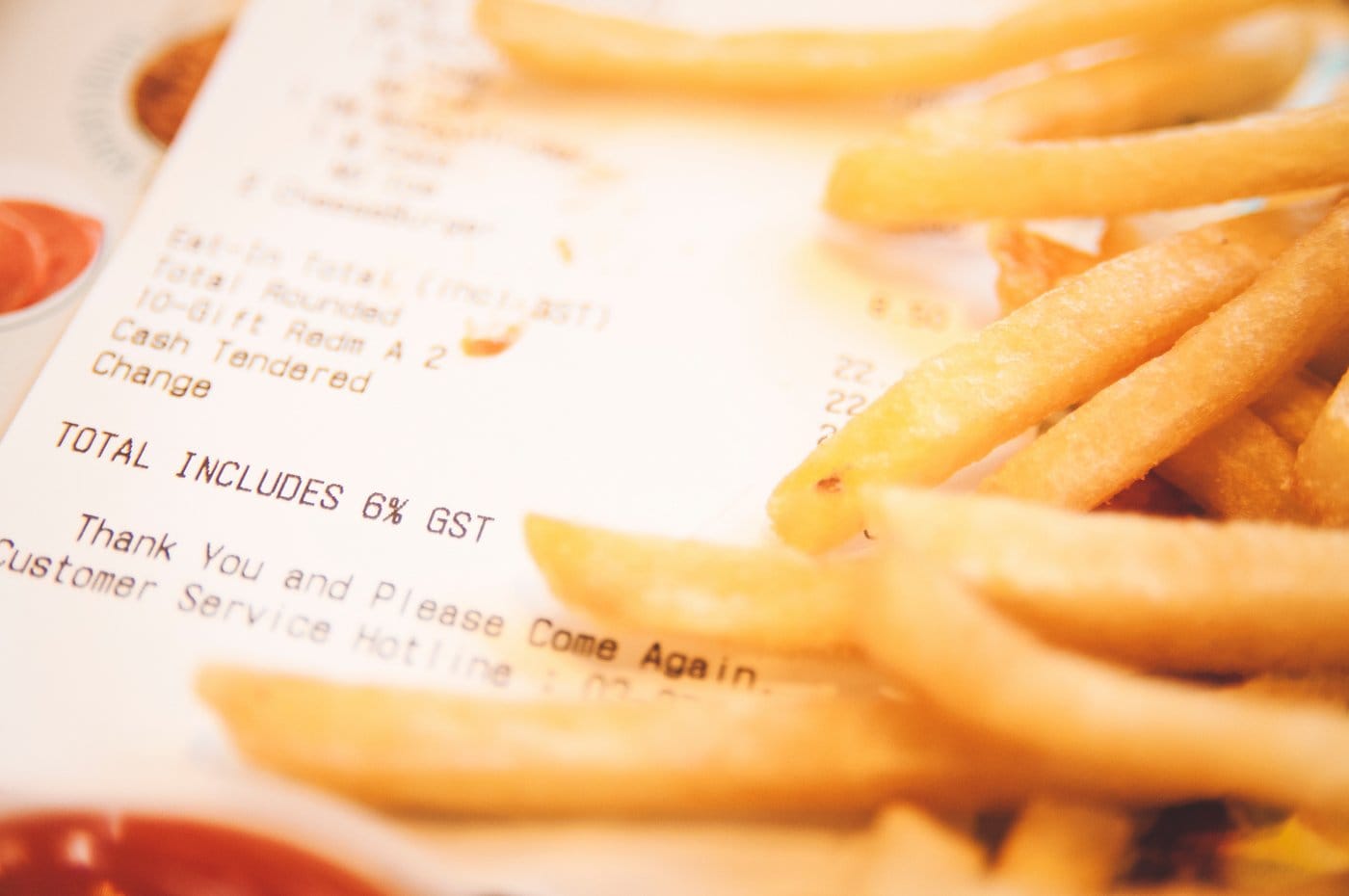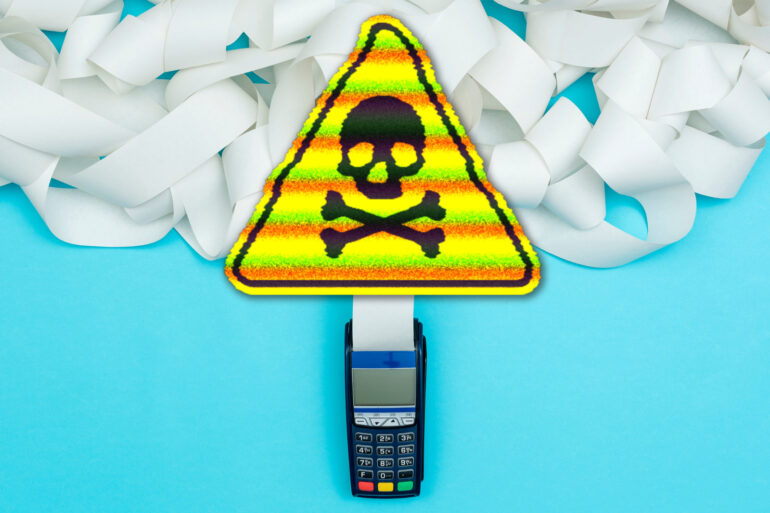Is touching receipts bad for you? Sometimes, even the simplest little things can actually be a health hazard. It turns out those long thermal cash register receipts that are absolutely everywhere nowadays are full of chemicals you probably don’t want to handle.
Cash register receipts printed on thermal paper (the paper with one smooth side that’s printed in black with the details of your transaction) can actually increase your BPA levels every time you handle them. More bad news: Hand sanitizer and lotion might be making the problem worse.
BPA on cash register receipts, tickets, in-store coupons and more
“BPA-free” is touted on all kinds of plastic food and drink products nowadays. So, assuming you don’t buy products with BPA — otherwise known as bisphenol A — you should be safe, right?
Bisphenol A (BPA) is a chemical commonly used in the polycarbonate plastic and epoxy resin manufacturing process. To everyday consumers, that means things like water bottles, dental composites, lacquers or resins used to line metal food and beverage containers… and also thermal paper cash register receipts.
This thermal paper is very common and fairly easy to spot. The Minnesota Pollution Control Agency (MPCA) says that you can tell a receipt is probably made with thermal paper if it discolors easily when scratched with a coin or paperclip.
“Thermal receipt papers are quite thin, and often have a slick feel or sheen finish. They are run through thermal printers and the printing develops from the heat; ink is not physically printed onto the paper.” (Years ago, you mgith remember that this same kind of inkless paper was used in fax machines.)

The American Chemical Society notes that the color developer — yep, BPA — causes the paper to react with the dye and change colors when heated.
And when we say it’s common, we mean it — in 2019, researchers in Spain reported that 90% percent of receipts are printed on paper containing BPA.
That’s easy to believe when you consider that in the US, they’re issued by practically every major restaurant, retailer and bank — including popular shops like Target, Wal-Mart, Lowes, McDonalds, Wells Fargo and Safeway, as well as by thousands of smaller companies — so you probably have some around your house right now, or stuffed in your pocket or purse.
The point is: This isn’t some isolated case.
Surface-level danger on those paper slips
Research conducted at the University of Missouri in 2014 provided the first data that BPA from thermal paper used in cash register receipts accounts for high levels of BPA in humans.
In particular, people studied showed a rapid increase of BPA in their blood after using a skincare product, and then touching a store receipt with BPA.
“Store and fast food receipts, airline tickets, ATM receipts and other thermal papers all use massive amounts of BPA on the surface of the paper as a print developer,” says Frederick vom Saal, Curators Professor of Biological Sciences in the College of Arts and Science at MU.
“The problem is, we as consumers have hand sanitizers, hand creams, soaps and sunscreens on our hands that drastically alter the absorption rate of the BPA found on these receipts.”
The researchers from the University of Granada in Spain warned that receipts should never come into contact with food — for example, while unpacking your meats in the kitchen, on in a takeout meal bag, or on a dine-in tray.
Adults and kids alike should try not to touch them at all. If you have to, keep the contact minimal: don’t crumple them up to throw them in the trash, don’t scribble notes on them, and stop storing them in your car, wallet or purse.
“In short,” said Nicolás Olea, professor of Medicine at the University of Granada, “we should handle these kinds of receipts as little as possible.”

What is BPA, anyway?
“While BPA has many advantages, it can potentially cause various health effects by moving through biological membranes, interfering with hormones and harming the nervous and reproductive systems,” according to the American Chemical Society.
“BPA first was developed by a biochemist and tested as an artificial estrogen supplement,” vom Saal says. As an endocrine-disrupting chemical, BPA has been shown to affect signaling mechanisms involving estrogen and other hormones.
“BPA exhibits hormone-like properties, and has been proven to cause reproductive defects in fetuses, infants, children and adults as well as cancer, metabolic and immune problems in rodents,” says vom Saal.
But there’s more. “BPA from thermal papers will be absorbed into your blood rapidly; at those levels, many diseases such as diabetes and disorders such as obesity increase as well,” he says.
Alternatives to Bisphenol A?
Getting rid of BPA isn’t easy — in part because one of the chemicals often swapped for BPA is Bisphenol S (BPS). Recent studies have shown that BPS does not seem to be any safer for people.
When are paper receipts not a problem? If your receipt has is actual ink printed on plain paper, it means a chemical developer — aka the BPA — is not being used.
MORE: Reusable grocery bags: How to keep ’em clean while going green
Skin care products dramatically boost BPA absorption
In the study, researchers tested human subjects who cleaned their hands with hand sanitizer and then held thermal paper receipts. As an added step, subjects who had handled the thermal paper then ate French fries with their hands. “The result was that BPA was absorbed very rapidly,” vom Saal says.
“Our research found that large amounts of BPA can be transferred to your hands and then to the food you hold and eat as well as be absorbed through your skin,” vom Saal says.
“Customers can easily identify these receipts since the ink fades with time,” said Olea. “Very often the only thing you find is a fine white powder that comes off them when you take them out of a handbag or purse. BPA is, precisely, that white powder that sticks to your fingers.”
The “Use of BPA, or other similar chemicals that are being used to replace BPA in thermal paper, pose a threat to human health.”
TIPS: How to minimize the danger from paper receipts
In all cases: Touch the paper as little as possible.
If you’re signing a credit card receipt at a restaurant, instead of holding it steady with your hand, put a glass or the salt shaker on it while you work out the tip and sign it.
If you’re at a restaurant and a receipt comes on your tray or in the bag, use a napkin to remove it as soon as possible.
If your food comes in contact with the receipt — like your fries were placed on top of it — return them and ask for a new batch.
It’s hard not to touch the receipt they hand you at a store, so — assuming you don’t want to wear gloves — make sure your hands are dry and clean, and that you don’t have any lotion or hand sanitizer on them.
If you don’t need the receipt, ask the cashier to not print one, or request that they throw it away for you before you even touch it. (And maybe tell them to be careful handling them.)
The Minnesota Pollution Control Agency also says not to put thermal receipt paper in your recycling bin. “BPA and other chemicals embedded in thermal paper can end up in wastewater from recycling plants or minimally contaminate other papers in the recycling stream,” they note, and add that for the same reason, you should not compost your receipts.
It’s just one more reason to try to go cashless/paperless.
September 2023 update: Retailers respond
Recently, the Ecology Center followed up on its 2018 study on the prevalence of hormone-disrupting bisphenols in retail receipts, and they found that several companies have taken definitive actions. By 2022, a noticeable decrease in bisphenol usage was observed, as confirmed by a subsequent Ecology Center report.
The latest data shows that the usage of bisphenol-coated receipts dropped from 93% in 2017 to 80% in 2022, while non-bisphenol alternatives jumped from 2% to 20%. Legislative moves are also afoot, with the state of Washington’s Department of Ecology proposing a ban and California considering similar legislation.
Major retailers like Costco, Culver’s, CVS, H&M, Lululemon, REI, Starbucks, Target, Trader Joe’s, and Whole Foods have shifted to bisphenol-free receipt options. And in a recent development, Walgreens has joined the ranks of responsible retailers by publicly pledging to phase out bisphenols and offer customers a no-receipt option.
Want to stay updated on this issue? Follow Green America’s Skip the Slip campaign!








